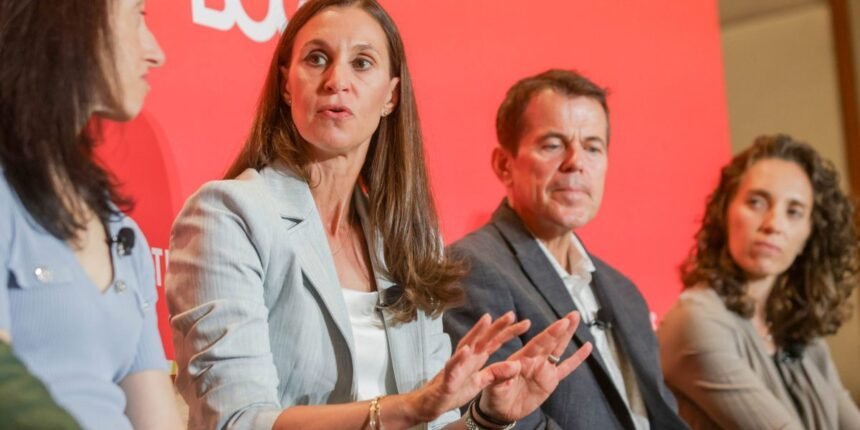More than 50% of the physical toys that Hasbro produces are made in China. That has put the G.I. Joe and My Little Pony toy manufacturer squarely in the crosshairs of President Donald Trump’s turbulent trade war between the world’s two largest economies.
“In February, and then again in April, and then again, every tweet after that, it has had a material impact on how we think about that $2 billion business,” said Gina Goetter, Hasbro’s chief financial officer and chief operating officer, during a Fortune COO summit event hosted by Boston Consulting Group.
Her motto to respond has been simple: don’t overreact, operate in facts, and avoid analysis paralysis. And Goetter applies that thinking to both how she responds internally at Hasbro and explains the company’s thinking to Wall Street investors as tariffs and counter-tariffs continue to evolve. “I have found that the way to really anchor everyone is on what we know in that moment and the decisions that we’re taking in that moment,” said Goetter.
COOs must confront a level of economic uncertainty that potentially could be greater in the U.S. than the Great Depression, the 2008-2009 Great Recession, and 2020’s COVID pandemic, according to an Economic Policy Uncertainty index that researchers have been tracking since 1900. But Goetter and her peers on the panel agreed that many of the lessons that they learned about resiliency during the pandemic can be applied to current geopolitical events.
Laura Giuliano, a managing director and senior partner at BCG, said the consultancy has encouraged clients to embrace scenario planning to better prepare their businesses as they face three big uncertainties today: geopolitical conflicts and tariffs; generational shifts as it relates to labor; and technologies like artificial intelligence and automation.
With scenario planning, businesses can map out the potential impacts they may face whether tariffs end up being 5% or 200%. “We are finding it to be the best method to prevent the stalling in decision making that tends to be the first reaction when this amount of uncertainty hits,” said Giuliano.
Land O’Lakes has embraced scenario planning and has created a “war room” to understand how much of the impact on tariffs is related to pricing of goods, the impact on supplies, and how much of the dairy cooperative’s capital will be affected. These are skills that Land O’Lakes developed during the pandemic, when supply chain disruptions impacted pricing for farmers, retailers, and suppliers.
“We don’t have it all figured out, but that war room is buzzing,” said Brett Bruggeman, executive vice president and COO of Land O’Lakes. “It teaches our organization, or helps build muscle in our organization, to be agile.”
Goetter said that action and a “no regrets” mindset is necessary to meet the moment. Even before the tariff wars unfolded, Hasbro knew it wasn’t wise to manufacture so many goods in China. CEO Chris Cocks told CNBC recently that Hasbro aims to get about “40% of global sourcing out of China by the end of 2026. I think we’ll hit that much earlier.”
Each business division at Hasbro has a team dedicated to figuring out ways to more speedily diversify their manufacturing away from China.
“We also believe that there’s a role that the U.S. could, and should, be playing in the long-term manufacturing footprint for Hasbro,” said Goetter.
If more manufacturers were to follow suit, it could especially benefit companies like Link Logistics, which was established by investment firm Blackstone in 2019 as an operator of last-mile logistics real estate, meaning the properties that hold goods before their final stage of delivery to consumers.
“What we’re starting to see is in the middle part of the country, more manufacturing interest, more operators who are doubling down on the fact that they really do believe we’re going to bring manufacturing back to the U.S.,” said Sonya Huffman, chief administrative officer at Link Logistics.
Huffman said business decisions are moving quickly, noting that in the back half of last year, Asian third-party logistics companies—which handle warehousing, inventory management, and transportation for manufacturers—were leasing a lot of space in West Coast warehouses in anticipation of tariffs hitting their goods. “We saw a lot of products coming in,” said Huffman. There’s also less appetite to sign longer term, multi-year warehouse leases, because of the constantly evolving business decisions.
She believed that allocating too much time to war rooms and scenario planning can have its downsides. “That trickles down to us that no one’s making decisions, everybody’s distracted, and how are we going to lease our space and get them to stay,” said Huffman.
Leaders on the panel also said they were keeping a close eye on talent development trends. Giuliano said if more manufacturing returns to the U.S., it will require companies to rethink how they will hire for and attract talent for that work. Generational trends are also a complicating factor.
“Can we say precisely how Gen Alpha is going to want to engage with their employees?” asked Giuliano. “No, but we know that Gen Z is now really shaking things up.”
Land O’Lakes has evolved their talent management approach, spending more time co-developing career plans with top managerial director-and-above level talent. “We try to engage and spend a disproportionate amount of time on talent,” said Bruggeman.
Goetter said Hasbro hasn’t historically prioritized guiding employees to think of working at the company as more than a job, but a place to grow a career. Leadership is investing more time in creating a culture where employees better understand their career development plan.
“We recognize it as a gap,” said Goetter. “And we’re working hard to put some of those tenants in place.”
This story was originally featured on Fortune.com







